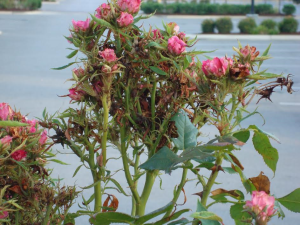Rose rosette is a devastating disease of most species of garden roses, including hybrid and shrub roses. Rose rosette disease has spread from the Rocky Mountains to the East Coast over several decades and is poised to obliterate the rose industry. To date, there is no known effective treatment.
Rose rosette is caused by an Eriophyid mite called Phyllocoptes fructiphilus, which transmits the virus. Symptoms of the virus include: (1) excessive thorn production, (2) leaf distortion, and (3) excessive branch development, known as “witches broom” that will eventually kill the plant.
U.S. plant scientists have joined a multi-state comprehensive project to develop a management plan. USDA has extended a $3.3 million research grant to a 17-member group headed by David Byrne of Texas A&M University to fight rose rosette. “We are anxious for us to develop options for managing this virus”, says Dr. Gary Knox, Professor of Environmental Horticulture and Extension Specialist at the UF/IFAS North Florida Research and Education Center. Rose production is a $400 million annual business in the U.S.
A nursery might not know it has the disease and sell rose plants to unsuspecting customers. Months later the disease shows up. The major issue is being able to detect the virus before it shows up. A Florida team is developing techniques to detect low levels of the virus in the plant. The goal is to detect the virus in non-symptomatic plants utilizing a rapid field-based assay. They are trying to develop a field-based detection system to find the virus early.
Scientists are looking at new compounds for preventing or managing the disease. The team is treating plants with compounds that would potentially help plants better defend themselves against the virus and are trying to reduce the severity of the symptoms.
Finally, plant breeders are attempting to develop a new generation of roses that are highly resistant to the rose rosette virus.
Information credit: Edited article from Greenhouse Grower Magazine, March 2016


 Posted in
Posted in 
